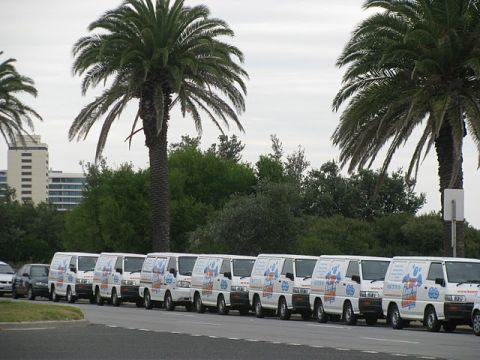
Could you run a cleaning business? In Australia our demographics show an ageing population and time-poor households, both good predictors for domestic services.
In part one of this feature, we revealed the industry trends according to IbisWorld; in part two we looked at some of the players in the sector; here we look at a cleaning business and a dry cleaning chain.
KEEN TO CLEAN
Brijesh Purohit, managing director, says finding suitable franchisees without compromising the quality is the biggest challenge for the business which is seeing rapid growth.
The bundling concept highlighted by IbisWorld fits right into the Keen to Clean model, he says.
“We are already in process of starting a gardening and lawn mowing division. It is the trial phase and we have been working on it for the last eight to nine months. We are gathering data for marketing and preparing internal systems to launch this added service to our valued clients. We figure it’s better to keep our customer under our roof as we are already providing them with one service. If they are happy, then they are happy to use more of our services.”
What relevance is there for eco-friendly products/services?
“There is huge impact of eco-friendly products on cleaning services. We are already using biodegradable chemicals in the majority of our cleaning services and also educating our customers on the reasons why. It does cost a little extra, but at the end of the day we must think about the impact these have on the environment and our customers’ families.”
Keen to Clean has set a goal to sell 100 franchises by 2015 by expanding the franchise footprint and through the new division focused on gardening services.
DAISY H2O DRY CLEANING
It’s clear from the name that Daisy H2O dry cleaning has an environmental focus. The service caters for both private and corporate customers – the latter particularly price conscious, says CEO Paul Littmann.
“There’s a lot on their websites about environmental concerns but unless you drop the price, they won’t move,” he reveals.
The price differential is really hard work, he adds. “From a franchisor’s perspective unless you have a dedicated warehouse structure you can’t really take on corporate clients. We can match prices and we do, but it takes a lot of energy.
“The individual franchisee can negotiate price to a local sports centre, for instance. We can add a benefit when it comes to a big contract, we can facilitate this.”
The business has shown strong growth year on year in individual stores, Littmann reports.
The environmental nature of the business is a benefit for private customers. “It is good for allergies, good for asthma and there is greater awareness now. We’re seeing that at the cash register.”
What’s on the cards is a new product offer: Littmann is looking at establishing a mobile dry cleaning service and is right now working on the van prototypes because the point of difference will be doing the cleaning in the van itself.
Growth at the domestic level will mostly be driven by consumers, he says. Littmann has 45 stores as the national target.
Elsewhere, the business has attracted a lot of interest from India, and Littmann is in the process of negotiating franchise representation there.
“We are the greenest dry cleaner in the world. This is a unique point of difference.”

